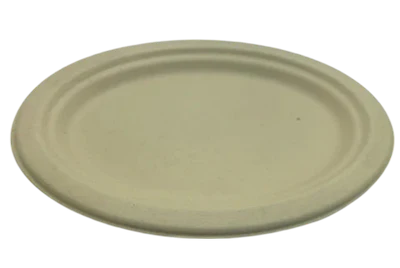The modern foodservice industry is facing increasing pressure to adopt sustainable practices, and one significant shift is the move away from traditional, environmentally damaging materials like Styrofoam towards greener alternatives. Among these, sugarcane plates are emerging as a frontrunner, offering a compelling combination of functionality, cost-effectiveness, and environmental responsibility. This article explores the key reasons behind this transition, highlighting top sugarcane-based products available.
1. Compostability and Biodegradability
One of the most significant advantages of sugarcane plates is their inherent compostability and biodegradability. Unlike Styrofoam, which can persist in landfills for centuries, EcoQuality 6" Round Compostable Natural Sugarcane Plates are made from bagasse, the fibrous residue left after sugarcane stalks are processed. This makes them 100% biodegradable and compostable, meaning they break down naturally in a relatively short period, enriching the soil instead of contributing to landfill waste. This aligns perfectly with the growing demand for truly sustainable disposables.
2. Durability and Versatility
Despite their plant-based origin, sugarcane plates are surprisingly durable and versatile, often outperforming their Styrofoam counterparts. EcoQuality 10" Oval Compostable Natural Sugarcane Plates, for instance, are sturdy enough to hold a variety of hot, cold, wet, or greasy foods without bending or leaking. They are also often microwave and freezer-safe, adding to their practicality in diverse foodservice settings, from casual takeout to catering events. This robustness ensures they can handle the demands of modern food service without sacrificing eco-friendliness.
3. A Renewable Resource
Sugarcane itself is a rapidly renewable resource, making bagasse a sustainable raw material. Unlike the petroleum-based Styrofoam, which relies on finite fossil fuels, EcoQuality Compostable Natural 3 Compartment Sugarcane Round Plates utilize a byproduct of sugar production, maximizing resource efficiency and reducing reliance on non-renewable sources. This makes sugarcane plates a responsible choice that supports a more circular economy and minimizes the environmental impact associated with raw material extraction.
4. Health and Safety
Concerns about the potential leaching of harmful chemicals from Styrofoam into food are also driving the shift towards safer alternatives like sugarcane plates. EcoQuality Compostable Rectangular Eco-Friendly Container Trays, made from bagasse, are generally free from toxins like BPA and polystyrene, offering a healthier option for consumers. This natural composition ensures that food served on these plates remains free from potentially harmful substances, enhancing both food safety and customer well-being.
5. Positive Customer Perception
In an increasingly eco-conscious market, businesses that adopt sustainable practices often gain a positive reputation and attract environmentally aware customers. Using EcoQuality Compostable Sugarcane Bowls with Fiber Lids and plates signals a commitment to environmental responsibility, which can be a significant marketing advantage. Customers are often willing to support businesses that align with their values, making the switch to sugarcane tableware a smart business decision as well as an ethical one.
Sugarcane plates are rapidly replacing Styrofoam in modern foodservice due to their superior environmental benefits, including being 100% biodegradable and compostable as seen in EcoQuality 6" Round Compostable Natural Sugarcane Plates. Their durability and versatility, exemplified by EcoQuality 10" Oval Compostable Natural Sugarcane Plates, alongside the use of a renewable resource in products like EcoQuality Compostable Natural 3 Compartment Sugarcane Round Plates , make them a practical choice. Furthermore, the health and safety advantages of options like EcoQuality Compostable Rectangular Eco-Friendly Container Trays, and the positive customer perception associated with using sustainable tableware such as EcoQuality Compostable Sugarcane Bowls with Fiber Lids, solidify sugarcane as the material of the future for eco-conscious foodservice operations.






